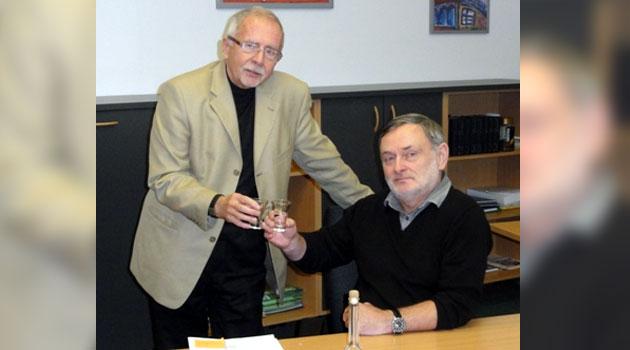Czech ombudsman Varvařovský resigns, Křeček is his temporary replacement

Czech ombudsman Pavel Varvařovský resigned from office yesterday. He did not give a reason for stepping down in the middle of his six-year term.
The Czech News Agency reports that Iva Hrazdílková, spokesperson for the Office of the Public Defender of Rights (the ombudsman) has said the post will be filled by Stanislav Křeček until a new ombudsman is elected. By law, legislators must vote in a new ombudsman within 60 days of the post becoming available.
"The written resignation of the current ombudsman was submitted on Thursday in the office of the chair of the lower house, Jan Hamáček, by the head of the Office of the Public Defender of Rights, Pavel Pořízek," Hrazdílková said. The law says the ombudsman’s time in office ends when he hands his resignation in to the chair of the Chamber of Deputies.
All of the obligations powers of the ombudsman are automatically transferred to his temporary replacement until a new ombudsman can be elected. Varvařovský has not commented further on the reasons for his resignation.
"I have decided to resign and I thank all of my co-workers for their support and work ethic," he wrote recently to the Czech News Agency without adding any details. He cleared out his office on Wednesday.
Varvařovský, who is 69, was the Czech Republic’s second ombudsman after the founder of the office, the late Otakar Motejl. He has held the office since 13 September 2010.
From the start Varvařovský made no secret of the fact that was not very attached to the job. He said as much when legislators did not pay sufficient attention to his legislative recommendations, reflecting on what the point of his activity was.
Varvařovský had previously discussed resigning in meetings over who his deputy would be. After considering Jitka Seitlová he eventually chose Stanislav Křeček.
When seeking a new deputy ombudsman Varvařovský warned he might consider resigning if he and his new colleague proved unable to agree on how to collaborate. During his three years in office he has reviewed 26 000 complaints.
The biggest growth in complaints occurred in 2012, when the number of complaints filed year-on-year grew by one-fifth. In the vast majority of cases in which the authorities were found to have committed errors, he managed to ensure the situation was corrected, failing to do so in only 59 cases.
Within the framework of his annual submission of reports about his activity, Varvařovský addressed the Chamber of Deputies with a total of 26 legislative recommendations. While the first recommendation received a relatively rapid hearing, none of the others were implemented by the legislators.
In two cases – the law on lotteries and the implementation of social security identification cards called s-Karty – corrections to the situation did not occur until the Czech Constitutional Court intervened. When he first took office, Varvařovský accented three matters he hoped to achieve during his term:
1) Strengthening the authorization of the Public Defender to include the option of filing a so-called action for the protection of the public interest over serious cases with the administrative courts. As of 1 January 2012 the Public Defender has this power. For the time being the office has used it only once, in the case of a solar-power electricity generator in the village of Moldava.
2) Expanding access by the Public Defender to the the Constitutional Court. Originally the Public Defender could only file motions to abolish regulations that were not national law (usually municipal ordinances). In many European countries the ombudsman has the right to also contest any law before the Constitutional Court. While the Public Defender’s powers have not been expanded to that extent, as of 1 January 2013 the Public Defender is able to join proceedings before the Constitutional Court as an additional party, including in cases of proceedings about abolishing laws. The Public Defender regularly uses this authorization.
3) Anchoring the Public Defender of Rights in the Constitution – this aim has not yet been fulfilled.
Varvařovský’s greatest success as ombudsman can be considered his transformation of the legal regulations for orphans’ annuities, a change which the late Otakar Motejl also pursued. As of 1 January 2012, some children who had previously been denied such annuities were now entitled to them. The amendment to the law on pension insurance halved the time that a deceased parent was required to have been paying into the pension system. This means an orphan’s annuity can be awarded to a child whose deceased parent has accrued at least 2.5 years of pension payments during the previous decade before his or her death. Parents 38 years old and older who died after 31 December 2009 must have been insured for at least five years during the 20-year period prior to their death. Children who were not awarded an orphan’s annuity because their deceased parent originally did not meet the criteria have been able to once again apply for the annuity with their local social security administration; should they meet the new, less stringent conditions, they will be awarded the annuity effective as of 1 January 2012, not retroactively.
While the ombudsman’s comprehensive critique of the public administration and the s-Karty program did not prompt a direct response from legislators, that matter did ultimately make it to the Constitutional Court, which overturned the program in accordance with the opinion of the Public Defender of Rights. The case of the law on lotteries enjoyed similar success, as did the ombudsman’s fight for the right of municipalities to regulate gambling on their territories.